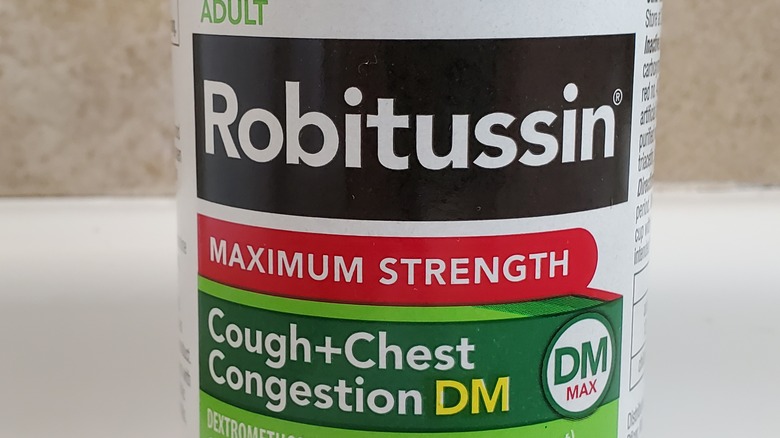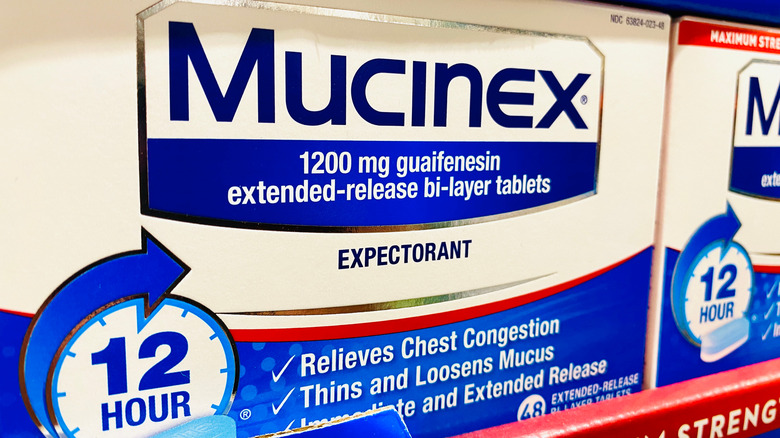Is It Safe To Take Cough Medicine While Pregnant? Here's What We Know
Getting a cold or the flu can make your life miserable. This can be doubly true when you succumb to a virus during pregnancy. Instead of grabbing some cough medication out of the pharmacy aisle, it's essential to consider any potential dangers over-the-counter medicines can have on your developing baby.
Wading the waters of medication and pregnancy can be a bit confusing to figure out. Given the potential risks, there is a lack of research on medications for pregnant women. However, Ashley Roman, MD, an ob-gyn with NYU Langone in New York City, told The Bump, "Many over-the-counter medications are safe to use in pregnancy, but there are a few surprising drugs that can lead to problems for the baby. Always speak with your doctor prior to taking any medication and always follow the dosage instructions on the package." Therefore, it's vital to be vigilant before grabbing that Robitussin bottle.
Cough suppressants and decongestants considered safe
Getting a stuffy nose and cough doesn't stop when you're expecting. But it can be much harder to know what medications you should and shouldn't take when you've got a cough that won't quit. Is it safe for you to have a dose of Robitussin to get your cough to subside? According to UT Southwestern Medical Center, cough suppressant dextromethorphan, commonly found in Robitussin and cough syrup, is safe for pregnant individuals. They noted that the maximum 24-hour dose is 120 mg.
The Official Publication of The College of Family Physicians of Canada (CFPMFC) also stated that decongestants, like pseudoephedrine and phenylephrine (found in Sudafed), should be used cautiously. A 2006 review in Birth Defects Research highlighted that when taken in the first trimester, there is a small chance that decongestants such as pseudoephedrine may lead to birth defects. Because of this, you might want to consult with your doctor when considering Sudafed during the first trimester of your pregnancy.
Also, reconsider decongestants during pregnancy if you have high blood pressure, according to UT Southwestern Medical Center. This medication can cause a racing heart and may possibly make you jittery.
Be careful of using expectorants
Suppressants and decongestants can help clear up the mucus and hinder your cough to get some sleep at night. They won't clear up the congestion in your chest, though. For that, many people reach for an expectorant, like Mucinex. This medication can make breathing easier since it thins out the mucus and clears up any gunk blocking your airways (via WebMD).
The main ingredient within Mucinex is guaifenesin. 2014 research from the American Family Physician stated the safety of this medication can't be determined due to insufficient research. It is recommended to avoid the drug within the first trimester. After the first trimester, it may be safe to use guaifenesin, according to Healthline. It's vital to discuss taking this medication with your healthcare professional to understand if it is appropriate for you. If this medication can't be avoided, follow the instructions carefully and take the minimum dose to be effective. WebMD stated that the maximum dosage for a 24-hour period was 2,400 mg although this may be different if you're pregnant.
Cough drops can be used to calm cough
You might not think anything of grabbing a bag of cough drops to soothe your throat and calm your cough. Expectant mothers must be careful of anything they put in their bodies, however, and cough drops contain medication. Mid-Atlantic Women's Care states that cough drops are considered safe to use short-term during pregnancy to calm a cough.
Throat lozenges typically contain menthol and other natural ingredients. Cough drops open up your nasal passages and helps to suppress that feeling you need to cough. The concentration of menthol used in the products is low, but the U.S. Pharmacist acknowledged that there is a lack of research on using menthol and camphor during pregnancy. Given the dose is low in throat lozenges, any associated risks would also be low. It also stated that Vicks VapoRub, a camphor-based product, has not been shown to cause fetal issues.
Menthol isn't the only ingredient found in most brands of cough drops. Healthline stated that cough drops can also contain herbs like peppermint, elderberry, and artificial sweeteners. Given the range of ingredients, discuss using cough drops with your doctor, especially if you have gestational diabetes.
Home treatments to try before hitting the cold and flu aisle
Research on pregnant individuals and cough medication is lacking since pregnant women are excluded from most studies due to their potential effects on the fetus. So, rather than take the risk, try a few natural ways to calm your cough. Ensure you rest and get enough fluids when a cough and cold have taken over your life. You'll also want to eat and drink foods that will support your immune system, like citrus fruits and ginger.
Try gargling with salt water to help clear out your nasal passages and loosen up phlegm. A 2005 study in the American Journal of Preventative Medicine showed that gargling with salt water was also an effective way to help prevent upper respiratory tract infections. You might also want to shoot some saline up your nose to help clear out and thin the mucus that runs into your throat. It's also essential to keep the air around you moist, according to Medical News Today. Invest in a humidifier to keep your nasal passages and throat lubricated.
Many medications are considered safe for pregnant individuals to use. However, given the lack of research and the fragile nature of the fetus in the first few months, you might want to avoid them during your first trimester. It's always essential to ask your healthcare provider for their opinion.





